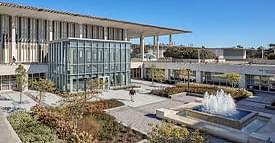Bachelor of Science [B.S] (Dietetics)
Field of Study:
₹9.5 L/Yr
Courses in the option in General Dietetics meet the requirements of the Academy of Nutrition and Dietetics' Commission for Education in Nutrition and Dietetics (ACEND) for an accredited Didactic Program in Dietetics (DPD).
Faculty and Facilities
Faculty members, in addition to teaching and advising, are actively involved in research and other professional activities. Facilities include a food and sensory laboratory for courses and research in food science and nutrition. Students learn to use software programs for nutrition analyses, food cost control, and recipe and menu evaluation. Externships are coordinated for majors in a variety of community settings such as the programs associated with the Center for Healthy Communities (CHC).
Career Outlook
The US Bureau of Labor Statistics projects the employment of dietitians and nutritionists is expected to increase 21% from 2012-22 as a result of the role of food in preventing and treating illnesses, such as diabetes. More dietitians will be needed to provide care for patients with various medical conditions and to advise people who want to improve their overall health. An aging population will boost the demand for dietitians in nursing homes and assisted living facilities. The demand for nutrition managers is strong. The fastest growing segment is in the area of eldercare. Nutrition managers in schools will need expertise in child nutrition programs.
Graduates may also work in food service and processing industries, food safety and inspection services, wellness programs, public communication, and product development and promotion.
Nutrition and Food Science majors gain knowledge and skills in nutrition communication and education, nutrition and disease, community nutrition, food science, and foodservice management.
The Minor in Nutrition offers an area of specialization for majors in exercise physiology, child development, nursing, health science, and others.
The Minor in Foodservice Administration offers an area of specialization for majors in business administration, management, marketing, recreation, and tourism.
The mission of the MS program in Nutritional Science is to provide educational experiences for students to increase their expertise in the science of nutrition and nutrition education. Students gain confidence in conducting and analyzing research. The program will prepare students to become competent, evidence-based nutrition professionals and practitioners. The Option in General Nutritional Science is designed to increase competence in the science of nutrition and the Option in Nutrition Education is designed specifically to facilitate nutrition professionals in communicating information to promote optimal health and nutritional status.
A post-baccalaureate Dietetic Internship, which is accredited by ACEND, is available for graduate students who wish to become eligible to sit for the registration examination to become registered dietitian nutritionists and who are enrolled in the MS in Nutritional Sciences program.
TOP Scholarships
| Scholarship name | Award amount | Eligibility |
|---|---|---|
| - | - | - |
| - | - | - |
| - | - | - |
Key Resources for Your Study Abroad Journey
Scholarship Grants & Financial Aids
| Name | Scholarship Per Student | Level of Study | Type | |
|---|---|---|---|---|
| QS scholarships | Scholarship per studentVariable Amount | Level Of StudyBachelor | TypeMerit-Based | |
| WU Foundation Global 52 Scholarship | Scholarship per student₹ 2.1 L/Yr$2,500 | Level Of StudyBachelor | TypeMerit-Based | |
| Jane M. Klausman Women in Business Scholarship | Scholarship per student₹ 4.3 L/Yr$5,000 | Level Of StudyBachelor | TypeMerit-Based | |
| SWE Scholarships | Scholarship per studentVariable Amount | Level Of StudyBachelor | TypeMerit-Based | |
| Young Women in Public Affairs Award | Scholarship per student₹ 3.4 L/Yr$4,000 | Level Of StudyBachelor | TypeMerit-Based | |
| BeArt Presets-Academic Scholarship | Scholarship per student₹ 1.7 L/Yr$2,000 | Level Of StudyBachelor | TypeMerit-Based |
Similar Colleges


University at Albany


Northern State University


Abilene Christian University
.jpeg?h=143&mode=stretch)

Ohio Northern University


University of South Carolina


University of Akron


State University of New York Polytechnic Institute


University of New Mexico





















.png?h=40&w=40&mode=stretch)





Comments